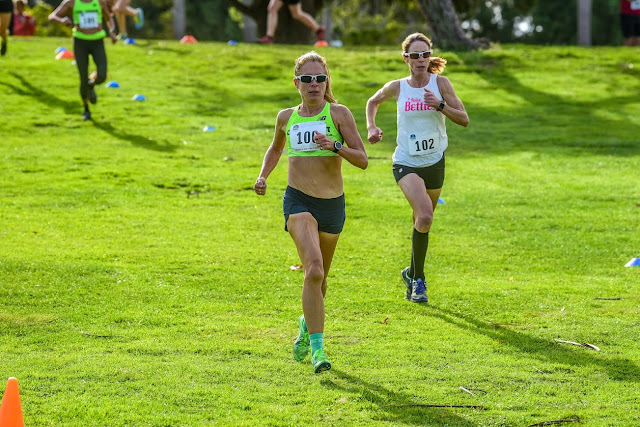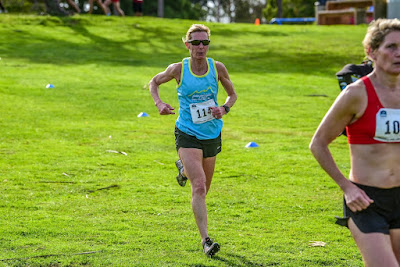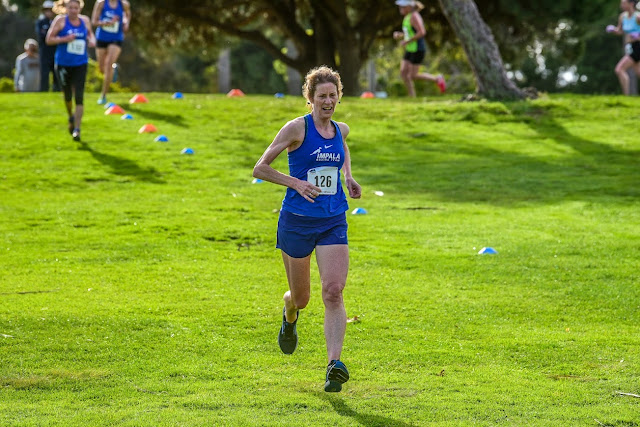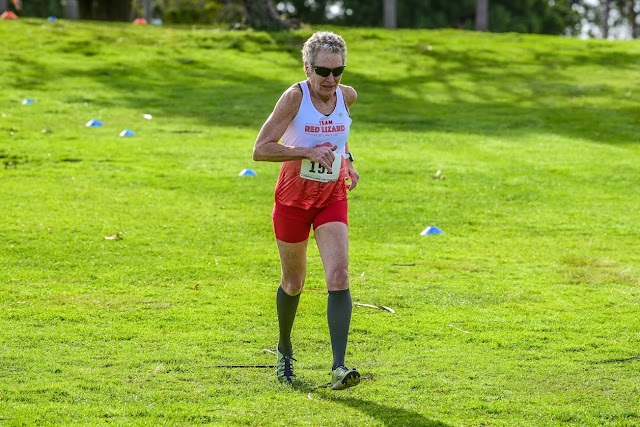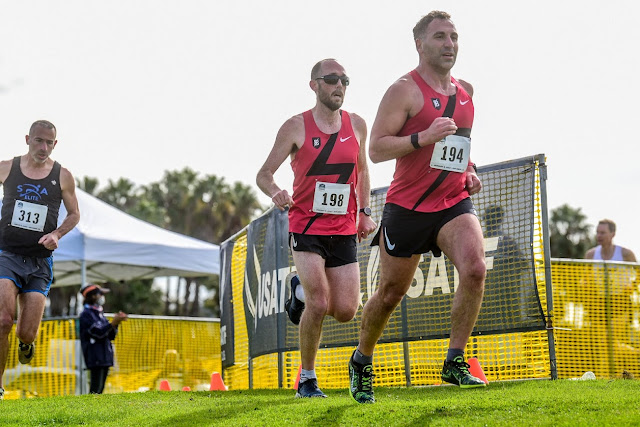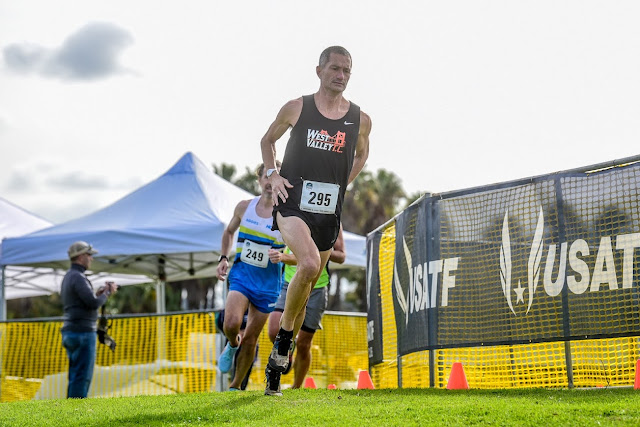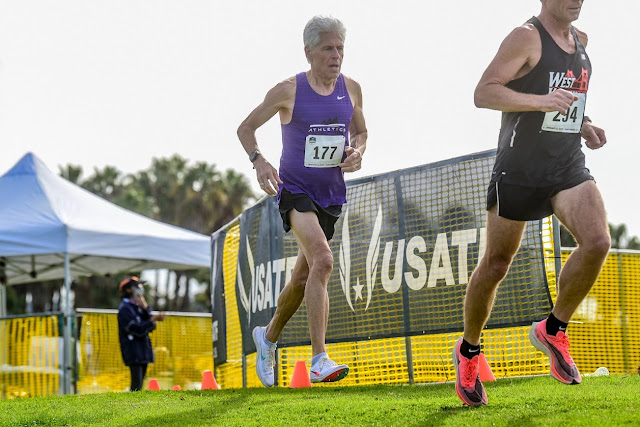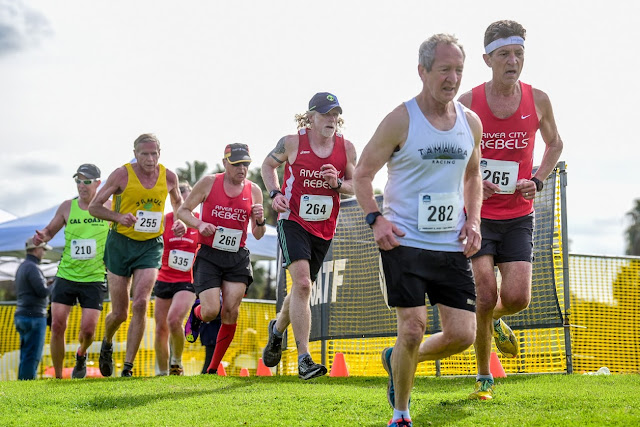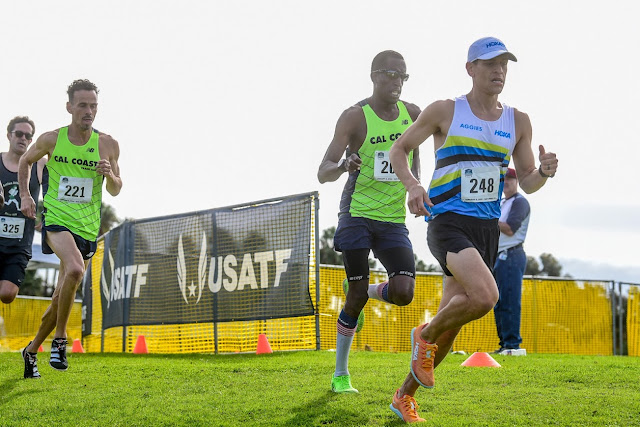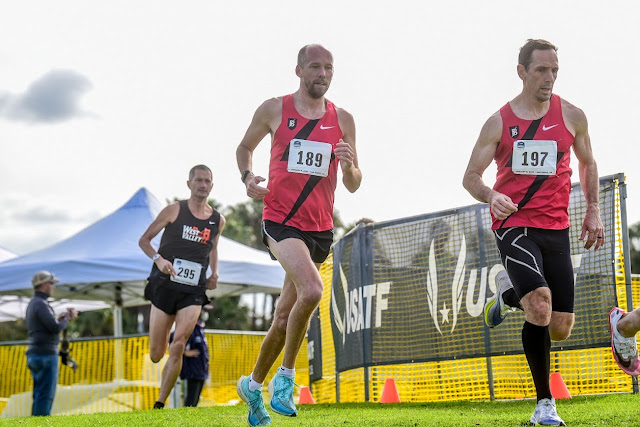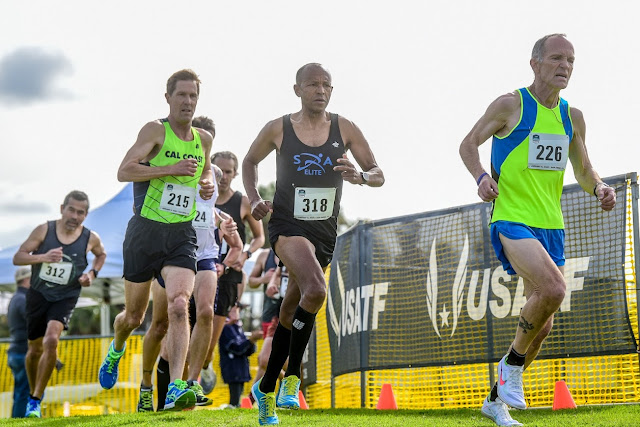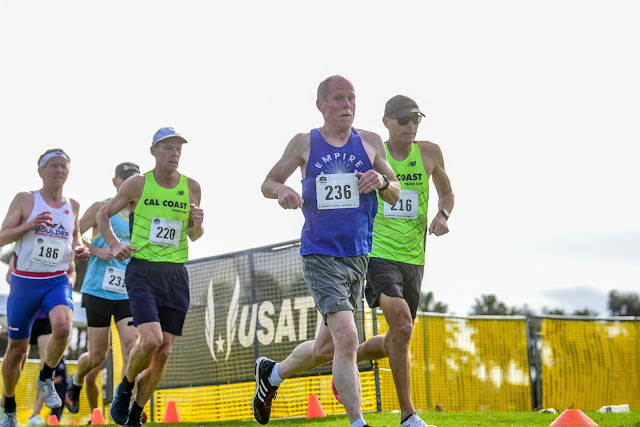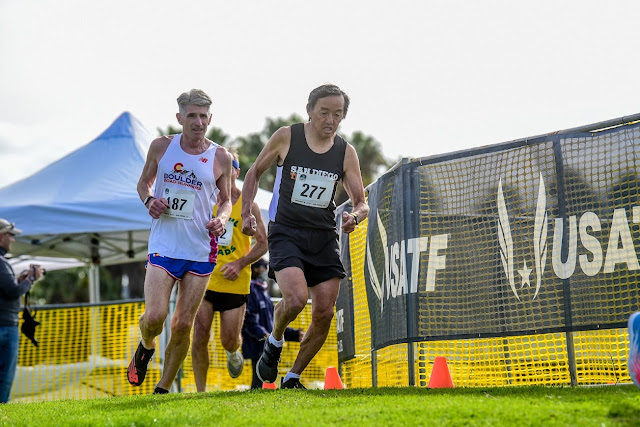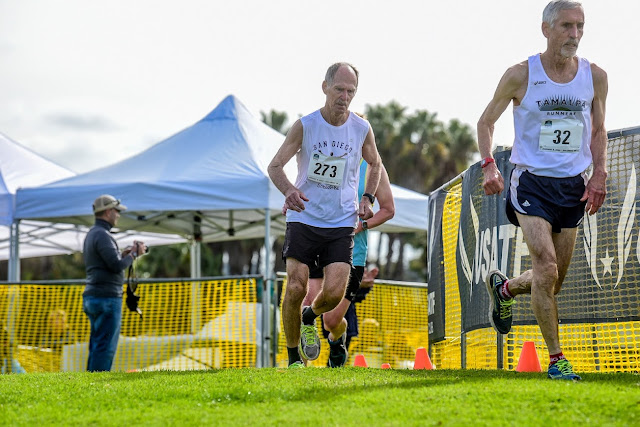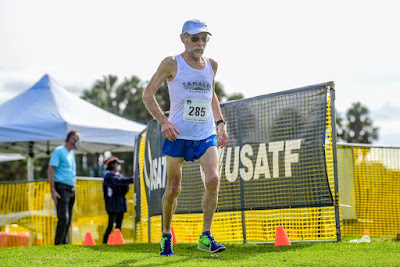January 24, 2022 Many teams live and die on Club Cross each December. The same is not true of Cross Country Nationals which are often thought of primarily as Individual Championships. That is in part because the Open races at these Championships, at least every other year, have been selection events for Team USA at the World Cross Country Championships. But there is something about the cachet of winning a National Championship or even making the podium that brings out teams. Also some teams have their eyes on the prize of a National Masters Grand Prix Team Championship. The 2022 MNGP Championships require participation in at least three events; the best 5 events make up the final score for the MNGP. Teams that love Cross Country will run Club Cross, for one, and maybe Cross Country Nationals for the 2nd of their events. If they choose to compete at the Masters 5 km Championships (in Boulder, CO this year) that would give them three events, all of which are Cross Country. Pick out two road races (1 Mile - Rochester NY, 5 km - Atlanta GA, 10 km Dedham MA, 12 km Highlands NJ, 10 Mile-Sacramento CA, Half Marathon Syracuse NY) and you've got 5. In any case, although the entry lists are shorter than at Club Cross, the teams battle just as fiercely for the win and for MNGP points!
Note 1: Top 5 runners score for the Men 40-59 teams but for Men 60+ and for Women only the top 3 are scored.
Note 2: USATF required a negative Covid test within three days of the race for runners to be allowed to compete. They also provided on site testing.
WOMEN
40+ Four teams were entered. Cal Coast, from the greater L.A./Orange County area, finished 2nd at Club Cross, and Team Red Lizard, from the Portland area, 7th, so one would think Cal Coast was a strong favorite. If the team competitors were the same each time, that would likely be the case. But with only 3 runners scoring, and given various commitments that get in the way of travel and competing, it is not that unusual that 1 or more of the athletes will be different from race to race. Cal Coast's number 2 and 3 runners from Tallahassee would not be at this race, but they had a new addition, transplanted easterner, Christy Peterson, who will be a nice addition for the team. Her last year has been up and down with injuries but she has been running well lately and will add to Cal Coast's strength. The Red Lizard roster at Club Cross consisted of Carre Joyce Heineck, Wendy Terris and Michelle Richards. At Mission Bay, Heineck and Richards were replaced by Renee Metivier and Renee Gordon. Heineck finished 3rd in the team competition at Tallahassee; she would be a tough act to follow. But Metivier was more than up to the task, racing to a big lead over the first loop.
Renee Metivier building a large lead to help her team with a #1 finish
All photos courtesy of Michael Scott
Cal Coast's Maggie Shearer could not keep pace with Metivier but she was well ahead of everyone else in the team race. With strong support, Cal Coast could still challenge for the win. But the other new Red Lizard runner, Gordon, was next across the 2 km mat, followed 6 seconds later by Amy Alzina of Team Montecito, like Cal Coast, from Southern California. Ten seconds later there were two more Red Lizards, Terris and Crystal Query, and a Montecito, Jennifer Brown.
In the thick of it! Jennifer Brown, Team Montecito, leads Crystal Query & Wendy Terris, both of Team Red Lizard, and Vivien Hyman of Janes Elite
Ten seconds further back we find Peterson, with her teammate, Carla McAlister, 11 seconds back and just 9 seconds ahead of Montecito's #3 runner, Kimberly Hazard. With their runners in 1, 3, 5, and 7, there would have to be major shocks to the race over the next two kilometers to prevent Red Lizard from winning. It was very tight for 2nd place. Cal Coast had a slim 1 point lead, 19-20 over Montecito. A small change in order could flip those scores. There were two important changes on the 2nd loop. Montevito's Brown moved out of that 3-athlete pack and was now running 5-10 meters ahead of Terris in 5th. That made little difference to Red Lizard, increasing their in process score from 9 to 10, but it did move Montecito into a tie with Cal Coast at 19 all. But the second change erased that tie. Query had been unable to stay even with Brown and Terris, and Peterson had switched to a higher gear, moving past Query, the Red Lizard, to hold a slim 2 second lead at that point. That moved Cal Coast back ahead 18-19. But could Peterson hold that edge? She would need to if Cal Coast was to collect a 2nd place finish!
The battle between McAlister and Hazard was just as important. McAlister had just 15 meters on
Carla McAlister 106, #3 runner for Cal Coast, needed to deliver for a Cal Coast 2nd place team finish.
Hazard. It was still anyone's race! Over the final loop, Brown was able to consolidate her lead over Terris, taking 5th by ten seconds. Peterson made a run at Terris but fell 3 seconds short. But that would have been icing on the cake; the important thing was that she kept Query at bay, giving Cal Coast a one point lead as long as McAlister had not faltered. They had to wait a minute after Query finished but McAlister finished next. She had done it; she kept Hazard 6 seconds back. Team Red Lizard had the big win, with just ten points. But Cal Coast got their 2nd place finish by a single point! Peterson had proven to be a valuable addition; Shearer, Peterson and McAlister celebrated a job well done and a second consecutive runner up finish at a national championship.
Team Red Lizard 10 24:05 avg time per scoring runner.
Cal Coast TC 18 25:37 Team Montecito 19 26:08
50+ The three teams contesting the event with complete teams were the Colorado Racing Club out of Boulder, Cal Coast, and the Impala Racing Team, of the San Francisco Bay area. Neither Colorado nor Cal Coast had contested the 50+ division at Tallahassee. Impala had contested the event, with three athletes from the 60-64 division, finishing 6th. I speculated that they had one or more 50-59 year old athletes who, at the last minute, were unable to compete. This time Impala had only one 60-year old on their team; the other three competed in the 60+ division as they usually would. Colorado was led by Colleen De Reuck, the 4-time Track and Field Olympian and Masters triathlete. Would DeReuck be able to lead her team to victory or would the Impalas return to the top of the podium? They last enjoyed that spot at Club Cross in Bethlehem PA in 2019. Or would the Cal Coast 50+ team outshine their 40+ team and take the top prize?
DeReuck took her role as leader seriously. By the end of the first loop, she was the first runner in the team section with a lead of over 100 meters on the 2nd runner, Elizabeth Guerrini, of the Impalas.
Colleen DeReuck building a big lead on Loop #1 to lead her Colorado Racing Club team in their hunt for a win.
Fifty meters back from Guerrini, two Colorado athletes, Lydia Dissly and Marcy Cote, were running in tandem. That gave CRC 1st, 3rd and 4th at that point. Someone would have to break up that duo or Colorado was headed for a win. Guerrini's teammate, Jeannie Robinson was only 40 meters back, but she had her own CRC runner to battle with, Ashley Faulkner, who was running by her side.
Forty more meters found the first of three Impalas,Carol Keller in 7th, followed 50 meters further back by her teammates, Gina Edwards and Angela Longworth in 8th and 9th. Then came the 3rd Cal Coast runner, Christine Onufrak in 10th, with Hronn Gudmundsdottir in 11th. The score at that point was 8-17-24, CRC, Cal Coast, Impala. Unless a major upset happened over the next two loops, that would be the order of finish. There were a few cases where a runner moved up or back a position . The only change that affected the final score was Gudmundsdottir passing Onufrak to finish 10th and push her rival back to 11th. But that just made the final score 8-18-24. It would have been a different story, perhaps, if Gudmundsdottir had the kind of conditioning she displayed at Lehigh in December 2019, when she finished 2nd in this division at Club Cross. We can hope she is working her way back into condition and will show up strongly later this year.
Colorado Racing Club 8 27:33 Cal Coast Track Club 18 29:15 Impala Racing Team 24 31:00
60+ This was a shootout between the Impalas and the locals, the San Diego Track Club. Unlike at Tallahassee, the Impala athletes in the 60-64 division got to run with the 60+ team, not in the 50+ division. Impala made sure there was no doubt at this event who was top dog in the 60+ division. Among complete teams, their Stella Gibbs was first to the 2 km mat in 8:51. She was followed by her teammate, Suzanne Cordes,16 seconds later; the 3rd Impala, Eileen Brennan-Erler was just 40 meters away in 3rd.
Eileen Brennan-Erler races over Loop #1 trying to deliver the goods as the Impala Racing team's #3 runner
Brennan-Erler had 150 meters on the first San Diego runner, Karen Simmonds, who crossed the mat in 10:08. Fifty seconds later, Ernestina Martin, #2 for San Diego crossed the mat with the other two San Diego runners, Tina Breen and Kathy Linenberger, 15-20 meters back. Unless something surprising happened, Impala would score a 1-2-3 sweep! And that's the way it unfolded, with no major changes. Gibbs, Cordes and Brennan-Erler finished 1-2-3 for the Impalas in times ranging from 28:23 to 29:30. San Diego took 2nd, with a 4-5-6 finish in times ranging from 32:10 to 34:51.
Impala Racing 6 28:55 San Diego Track Club 15 34:03
70+ Team Red Lizard was going for two in a row. They took the top Division prize at Tallahassee, defeating the Atlanta Track Club, with a 1-2-3 sweep for a 6-15 win. The Impala 70+ team would try to break them up in San Diego. Jeanette Groesz is the key runner for Red Lizard; she is really at the top of her game. She roared out to a huge lead, crossing the 2 km mat in 10:00, with more than 100 meters on her staunch #2 teammate, triathlete Sharon Gerl.
Jeanette Groesz building up a substantial lead to help her Red Lizard team in their quest for a 70+ win
That gave Red Lizard 1-2. But the Impala's Jo Anne Rowland was having nothing of a sweep. She could not keep pace with Groesz and Gerl, but Rowland crossed the mat 3rd, in 11:21, over 150 meters ahead of the Red Lizard #3, Susan Staffel.
The Impala's Jo Anne Rowland 136 races alongside Blanca Sanchez, attempting to break up the top three runners from Red Lizard so her Impala Racing team could have a shot at a 70+ win.
And Staffel was only 5 seconds ahead of Donna Chan, the Impala's #2. As it turned out, everyone held their place; despite her best efforts, Chan was not able to close the gap to Staffel. In fact, Staffel widened the gap a bit. In the end it was Groesz and Gerl 1-2 for Red Lizard in 31:56 and 33:47.Rowland claimed 3rd in 35:02. Staffel closed things off for the Red Lizards, in 38:07, giving Red Lizard a 1-2-4 near sweep. Chan took 5th in 38:29, with her teammate, Irene Herman 52 seconds back in 6th. Marilyn Nippold provided solid insurance for Red Lizard. Had any of their top 3 run into trouble, Nippold would have sealed the victory with her 43:48 effort.
Team Red Lizard 7 34:36 Impala Racing 14 37:38
The Impala's took away the most hardware from the Women's section, with a 1st, 2nd and 3rd place effort. If you value Gold Medals, Team Red Lizard had the best outing with two first places. Cal Coast was not far back from those two with two 2nd place results.
MEN
40+ This event boiled down to a duel between the powerful Bowerman TC out of Oregon, and the Cal Coast TC. Bowerman had the lower score at Tallahassee. But Cal Coast was certain Jacques Sallberg would run better in San Diego than he did in Tallahassee. Would Bowerman be able to pack enough runners together to offset the star power of Cal Coast's Roosevelt Cook and Sallberg?
The first 2 km loop was revealing. Cook and Sallberg performed as expected, clocking 27:31 and 27:37 for a 1-2 start, but then the first Bowerman train rumbled through with Gregory Mitchell, John Howell and Ahrlin Baumann in 3rd through 5th in times from 7:01 to 7:08. When Luis Agricola crossed the mat for Cal Coast six seconds later, one might wonder, where is Phillip Gonzalez? At Tallahassee, Gonzales was strong enough to run ahead of both Howell and Bauman. With Gonzales off his game, it would be tough for Cal Coast to hang with Bowerman.
 |
| Giving Chase to Sergio Reyes #248, Roosevelt Cook & Jacques Sallberg of Cal Coast, claim the top 2 spots in the 40+ team competition. |
Indeed, the next few runners across the mat were only a few second back and the first three were Bowerman runners, Nick Martin, Orestes Gutierrez, and Joshua Gordon. Fifteen meters back was Cal Coast's 4th runner, Trevor Cox in 7:26. Gonzalez was over 150 meters back, clearly running easy by his standards, presumably due to a minor (I hope) injury. That gave Bowerman a narrow lead 27-30. If Agricola or Gonzalez could move up, the score could be flipped. There was change over the second 2 km loop, but not the change that Cal Coast supporters were looking for. The top 5 were unchanged. But Bowerman's Martin had passed Agricola and now had a 30 meter lead. That gave Bowerman 3-4-5-6, and Bowerman's Gordon and Gutierrez were right on Agricola's heels. Cox and Gonzales were further back than before, with Cox 25 seconds out of 9th and Gonzalez another minute behind Cox. That left little doubt that their best hope was to give Cal Coast a 4th and 5th scoring runner so they could at least place in the competition.
From right: Joshua Gordon & Nick Martin, both of the Bowerman Track Club running in tandem to give their team its best shot at a win, with David Mastro #313
Martin's move gave Bowerman a 4 point edge, 27-31. Cook and Sallberg at 1-2 could not do any better. It seemed unlikely that Cox or Gonzalez would move up. That left Agricola as Cal Coast's only hope and he was under siege. Agricola fought as hard as he could over the next 3 loops, holding off Gutierrez. But Gordon was too persistent, passing Agricola and establishing a gap. In the end Cal Coast had 1-2 with Cook and Sallberg, as expected, but Bowerman had 3-4-5-6-7 from Mitchell, Howell Bauman, Martin and Gordon, leaving them with 25 points and the win! With Agricola, Cox and Gonzalez taking 8th, 10th and 11th, Cal Coast had 2nd place with 32 points!
Bowerman Track Club 25 29:23 Cal Coast Track Club 32 29:49
50+ This too was essentially a dual meet involving the Bowerman Track Club again, but against a different California rival, the West Valley Track Club, out of the San Francisco Bay area. When I ran in High School and even at College in the 1960's it was fairly common to run in dual meets. One of the lessons you learned was that if the other team had 2 or 3 very strong runners, it was imperative to break them up. If the other team took 1-2-3, it did not matter where the other runners finished as long as they finished. That was under the rule that only the 6th and 7th runners could displace any of the other team's top 5. As both teams here entered just 6 runners each in this race, that lesson applied. If either team took the top 3 spots they would win. WVTC's Mark Yuen and Ivan Lieben came in 1-2 at Tallahassee. BTC's Craig Godwin finished ahead of WVTC's #3 runner, David White. But Godwin was out for this event; BTC's top two runners, Matt Farley and Eric Hartmann finished over a minute behind White in Tallahassee. That would have to change or BTC would be running for 2nd place. It was a tall order; right now the WVTC 50+ train is robust!
These teams know each other well; they have been competing for the top spot in the 40+ division for years. The first loop made it clear that BTC will be happy when some injured guys return to action and/or a couple of younger guys age up. Lieben, Yuen and White came across the 2 km mat 1-2-3 for WVTC in times ranging from 7:01 to 7:27. It was 30 meters back to the first two BTC runners, Farley and Hartmann, running alongside the 4th WVTC athlete, Edward Randolph, and just ahead of the 5th one, Ahmet Gokcek.
Mark Yuen, West Valley Track Club, running in 2nd, later to take the lead, as his team endeavors to go 1-2-3 in the 50+ team competition, with Cory Smith, Hoka Aggies, in the background
Twenty meters further back found WVTC's Ben Turman and BTC's Gregory Coughlan duking it out for 8th and 9th. It was well over a hundred meters back to the other three BTC runners, Shawn Donley, Kevin Taylor and Larry Coxe. Nothing significant changed over the course of the race despite the best efforts of the runners involved. Yuennpassed Lieben to lead the WVTC top trio. BTC's Hartmann and WVTC's Randolph battled back and forth as Farley fell a bit off the pace. Randolph eventually pulled away as Farley recovered and moved back up with Hartmann. BTC's Coughlan got 15-20 meters ahead of WVTC's Gokcek in the middle of the race, but could not shake him.
Ahmet Gokcek, West Valley, leading Bowerman's Matt Farley #193 & Eric Hartmann #196 on the first loop of the Mission Bay course. with Mike Blackmore #297 and Adrian Herrera #308
With just one loop to go, Gokcek was even with Coughlan again, and managed to create a 10 meter gap by the time they crossed the finish line. In the end, West Valley's Yuen, Lieben, White and Randolph rolled to a 1-2-3-4 finish, broken up by Bowerman's Hartmann and Farley, in 5th and 6th, before Turman and Gokcek closed off the WVTC scoring ahead of the other 4 BTC athletes. In the end it was a good thumping! And one that Bowerman will be plotting to return in kind in the near-term future, perhaps as soon as this next October at altitude in Boulder. The next chance after that is on West Valley's home turf in San Francisco's Golden Gate Park. Perhaps they will all meet up in Sacramento to try their luck at the USATF Masters 10 Mile Road Championships?!
West Valley Track Club 17 30:13 Bowerman Track Club 41 23:14
60+ The 40+ and 50+ divisions require 5 runners for each team. At 60+ it changes to a minimum of three. After seeing two divisions that were essentially dual meets between two teams, it was fun to see a division with 6 teams entered: Athletics Boulder, Boulder Road Runners,Cal Coast TC, Jamul Toads, River City Rebels,and San Diego Track Club. The Toads and San Diego are local. Cal Coast comes down from the greater L.A./O.C. area, with the Rebels from the State Capital in Northern California. The other two dropped down from their Rocky Mountain home to contest the event. Boulder and Athletics Boulder went 1-2 at Tallahassee but they would have different personnel this time. Neither Tim DeGrado nor Roger Sayre would be toeing the line at Mission Bay. And the local teams might have an extra runner or two available that could make a difference.
By the end of the first loop.it was looking like the 6-way competition was morphing into three 2-way contests. Dan King and David Litoff led the way for a 1-2 standing for AB. But two of the next three, Ray Knerr and David Olds were from Cal Coast.
Dan King #177 off to a big lead to ensure his Athletics Boulder team has the best possible shot at a 60+ team win.
And then in 8th through 10th were the #'s 3 and 4 Cal Coast guys, Tomas Rodriguez and Brian Nelson, and AB's #3, Rick Bruess. AB was surely ahead, but Bruess would have to hang tough. And Litoff was only 20 meters ahead of Knerr so nothing was certain yet. The Toads had Jim Walsh in 4th place and their 2nd runner, Michael Lebold, was battling with BRR's Adam Feerst for 6th & 7th. BRR's #2 and 3 runners, were running in 12th and 13th, just ahead of a SDTC athlete, Les Shibata.
Michael Lebold, Jamul Toads, leads David Olds, Cal Coast as their teams vie for the 60+ podium.
It was another 50 meters back to the Toads #3 at that point, Greg Wagner. The Toads were ahead of Boulder RR, but anyone who knew Hubbart's history might worry that he would be likely to move up over the next few loops. Shibata was the top runner for San Diego, in 14th, but River City had Brent Cushenberry and Andy Harris in 17th and 18th, and Ronald Souza in 20th. San Diego's Paul Baumhoefner and Daniel Trone were in 21st and 23rd. River City was probably a little ahead of San Diego, but there was plenty of running left. The battle in the trenches was on!
By the end of the 2nd loop, things were clearer in the battle for the win. King was having another dandy tour of the course, almost 100 meters ahead of his #2, Litoff. Litoff, in turn, had pulled away from Cal Coast's Knerr, now over 150 meters separating them. It seemed very likely AB would get 1-2. AB's #3, Bruess, had also had a good loop, pulling out of the 3-way group contesting 7th through 9th. He now had over 50 meters on Nelson and Rodriguez. They would have to close that gap back up and get ahead for Cal Coast to have any shot at the win. But with Knerr and Olds solidly in 3rd and 5th, they were not threatened from below. The Toads still had Walsh in 4th, firing on all cylinders. But Lebold, their #2 had seen Bruess, Nelson and Rodriguez go by. He was now in 10th. Dunbar, dropping down from his 70-74 division to help out the 60's team, was still a solid 15th, now with Wagner just a couple of strides back. BRR's Feerst had moved past Lebold into 6th, but Hubbart and Barros were still in 12th and 13th. On paper at that point, the Toads were ahead 29-31- very close! Nothing much had changed between the other two, with River City ahead on paper at 56-59.
Les Shibata San Diego Track Club, leading Kyle Hubbart, Boulder Road Runners. Hubbart looks to move up to help his team while Shibata fights to keep ahead as their teams vie for the 60+ podium.
There was still plenty of suspense! The third of four loops brought no change to the struggle between AB and Cal Coast--too early to celebrate a victory, but AB supporters were feeling pretty confident. Not so for the Toads vs. BRR. BRR's Hubbart had moved past Witthauer into 11th, but that was balanced by the Toad's Dunbar moving ahead of San Diego's Shibata. It was still a 2-point margin, on paper, with a loop to go. It was the Toads 28 and BRR 30. The third duel tightened slightly. San Diego's Baumhoefner had moved past River City's Souza; that more than made up for Shibata losing a place. It was now 57-59 on paper. The last loop would decide things for good! Hubbart was on the move and at 6 km was less than 20 meters out of 10th. If he could get into 10th that would flip the two point deficit into a tie! San Diego could make up ground on River City. Trone, who was 1:04 behind Souza at 4 km cut that to 37 seconds at 6 km. If he could get past Souza, that would flip their score into a tie also!
When the final loop was concluded, Athletics Boulder had a fine 1-2-7 win over Cal Coast's 3-5-8. Hubbart was able to work his way past Lebold, who was spent from his early efforts to stay up well inside the top 8. Hubbart took the 10th spot from Lebold. Everyone else stayed the same so it was a tie at 29. BRR's #3, Barros, and the Toads' Dunbar, held their positions in 13th and 14th. BRR had the tie-breaker and took 3rd, closing off the podium. Trone was able to power past Souza to move San Diego into a tie. When Ostwald of BRR moved past River City's Harris, that raised River City's score up another point and gave San Diego 5th place.
Athletics Boulder 10 32:42 Cal Coast Track Club 16 34:49 Boulder Road Runners 29 36:31
70+ This division had fewer contending teams than 60+ but it was just as competitive among those three, the Atlanta Track Club, the Tamalpa Runners, out of the San Francisco Bay Area, and the local San Diego Striders. The Striders had taken the measure of Atlanta at Club Cross but every contest is a little different. And Tamalpa was contending rather than the Boulder RR team that took the top spot at Tallahassee. Those different dynamics could make a difference. Tamalpa was not at full strength; their #2 runner, Len Goldman did not make the trip. The first loop revealed that even without Goldman and their top 2 runners, Don Porteous and John Hirschberger, not at their best, Tamalpa was looking good for the win. ATC's Jerry Learned, Tamalpa's Don Porteous, and San Diego's Ron Wells crossed the 2 km mat at the end of the first loop as a trio. Officially it was recorded 1-2-3 in that order, it makes more sense to count them all as tied. If I split the 6 points and give them 2 points each, I can use that for a running score. ATC's #2, Dave Glass, was in 4th, about ten meters ahead of the Tamalpa #2, John Hirschberger. Tamalpa's #3 runner, Joe Schieffer, was almost a hundred meters behind Hirschberger, but had a solid grip on 6th place.
Jerry Learned, Atlanta Track Club, leading Don Porteous, Tamalpa #32 and Ron Wells, San Diego Striders on Loop #1, each seeking to lead their team to victory.
Schieffer had well over a hundred meter lead on San Diego's #2, Daniel Diehr. Tamalpa's #4, James Flanigan was a good 30 meters behind Diehr, sitting in 8th place. San Diego's 3rd runner, James Callaway, crossed the timing mat 37 seconds after Flanigan, and only 4 seconds ahead of Atlanta's Sam Benedict, in 10th. Jan Kafka, San Diego's 4th runner, was well over a hundred meters back from Benedict in 11th. The running totals at the 2 km mark showed Tamalpa in the lead at 13, followed by Atlanta with 16 and San Diego at 18. With scores this close it would make a difference how the top trio sorted themselves out. The outcome of the Glass-Hirschberger duel would also be critical. Diehr had a good gap on Flanigan but it was not so big that their places could be viewed as settled. Callaway's 4 second lead over ATC's Benedict seemed fragile. If Benedict could get ahead of Callaway, that would go a long way toward cementing 2nd place for Atlanta. When they crossed the 4 km mat, halfway through the race, Wells had clearly moved to the front, but had only 10-15 meters on ATC's Learned. Porteous was 30 meters behind Learned. That Learned-Porteous gap seemed more likely to stick. Glass was now 50 meters ahead of Hirschberger so that differential seemed reasonably secure. The gap from Diehr to Flanigan had also grown, leaving San Diego feeling a bit more hopeful. Callaway was now 150 meters ahead of Benedict so ATC's hope that Benedict might pass Callaway to gain a point seemed unlikely to be fulfilled.
Sam Benedict Atlanta leading Stephen Conner San Diego Striders mostly out of picture to left as their teams compete for the best podium position at Mission Bay
By the end of the 3rd loop, at 6 km, Wells had nearly a hundred meters on Learned. That was unlikely to change,; Learned had a bigger gap on Porteous too, now up to 50 meters. The 1-2-3 finish for the top dogs on each of the three teams, Wells, Learned, and Porteous, in that order, seemed secure. Everything else seemed more solidified with one exception. ATC's #3 runner, Benedict, had been running well ahead of the #4 San Diego runner, Kafka, but now was just 10-15 meters ahead, and was moving at a slower pace. Whether Benedict had run into a problem during the race or an old injury popped up, I do not know. But something is seriously wrong when a runner's pace suddenly kicks up by 40 seconds per kilometer. The in-process score at the moment was Tamalpa 14, Atlanta 16, and San Diego 17.
John Hirschberger Tamalpa leads a half dozen 50's and 60's runners around a ben on the First Loop of the Mission Bay course as he helps his team compete for a 70+ Team win
As Atlanta supporters feared, Benedict, despite his best efforts, was not able to hold off Kafka. That raised Atlanta's final score by a point, throwing them into a tie with San Diego. The tie-breaking mechanism gave the edge to San Diego.And that was the case, whether you used the current mechanism, the better finishing #3 runner. or the former and. perhaps more standard, mechanism of head-to-head comparison of the set of three runners from each team. Tamalpa, with Porteous, Hirschberger, and Schieffer finishing 3-5-6, had 14 points and a solid win. San Diego, with Wells, Diehr and Callaway claiming 1-7-9 had 17 points, tied with Atlanta. But, as noted, San Diego finished 2nd on the tie-breaker.
Tamalpa Runners 14 42:02 San Diego Striders 17 44:30 Atlanta Track Club 17 45:09
80+ We do not often have a competition in the 80+ age division, although that may become more common going forward. Tamalpa sent an 80+ team, as well as a 70+ team. The Florida Track Club West is a local San Diego club named after the famed Club in Florida associated with Frank Shorter, Jeff Galloway and Jack Bacheler. FTC West was determined to defend the home turf. The first two kilometer loop revealed a lot, although clearly too early for the outcome to be certain. Tamalpa's Hans Schmid had a 150-meter lead on the 2nd athlete, FTC-W's James Metts. Metts's teammate, Peter Rowat, was 50 meters back in 3rd place.
Hans Schmid Tamalpa builds a large lead on Loop 1 of the Mission Bay course, hoping to lead his team to an 80+ team win
It was another 50 meters back to Jerry Coletto and Elmo Shropshire running in 4th and 5th. Richard Williams, at 86, the oldest runner in this team competition, was over 300 meters back. His role was to finish so that FTC-W would get a team score. The only close races within this team competition, for 2nd and 3rd, and for 4th and 5th, involved runners on the same team. The outcome of those rivalries might be important to the team members, but not to the team competition. Tamalpa only led 10-11 but it was hard to see where FTC-W might make up that point. The only substantive change on the 2nd loop was that Shropshire passed, and left his teammate, Coletto, well over a hundred meters back. Now with over a hundred meters between every two competitors except for teammates, Metts and Rowat, the current 10-11 score seemed likely to be the final score as well.
Peter Rowat Florida TC West, leads Tamalpa's Jerry Coletto, aiming to help their teams win the 80+ team competition
And that is how it finished. In the end, Tamalpa's Schmid, Shropshire and Coletto went 1-4-5 for 10 points and Florida Track Club West claimed 2-3-6 for 11 points. It was another close one, but Tamalpa had the 80+ win to go with their 70+ victory!
Tamalpa Runners 10 56:34 Florida Track Club West 11 57:45
Over all 5 Men's Divisions, Tamalpa was the only team with 2 wins. Bowerman netted a 1st in 40+ and a 2nd in 50+. Cal Coast claimed 2nd place finishes in both 40+ and 60+.
The only team mentioned among the top teams for both Women and Men was Cal Coast! Although he would like all of his teams to win, Cal Coast Coach Bill Sumner should be proud of that achievement at Mission Bay!
That was it. Club Cross brings out a host of teams and many were, perhaps, not ready to contest another XC championship so soon. Having to move these Championships up so close to New Years probably did not help either. And, of course, covid had its effect as well. Now we are free to focus on the road races. Next up is the 5 km Masters Championships in Atlanta the last Saturday in February. Three weeks after that we go to Syracuse on the first day of Spring for the Half Marathon Championships. Early April finds the circuit moving back to the West Coast for the Masters 10 Mile Championships at the Sactown 10 in Sacramento CA. Late April finds Masters runners flocking to the rolling hills of Dedham, a small Boston suburb. We have been there 7 times before for the Masters 10 km Championships; it has always been exciting! The Masters Road Mile Championships in Rochester in late May set us up for the summer! Clubs should remember the motto that in Masters National Road Race Championships, "It takes three to boogie!" Whether your team is competing in Women's Divisions, Men's 60+, 70+, 80+ or Men's 40+ or 50+ you only need three runners, not 5 as is required for M40+ and M50+ teams in Cross Country. If you're going to Atlanta or any of the other road championships, don't go alone, grab a running partner or two from your Club to bring along and compete for both individual and team glory!
And remember, entry fees for Atlanta go up at midnight on the 10th of February. This week is the time to make your move!



